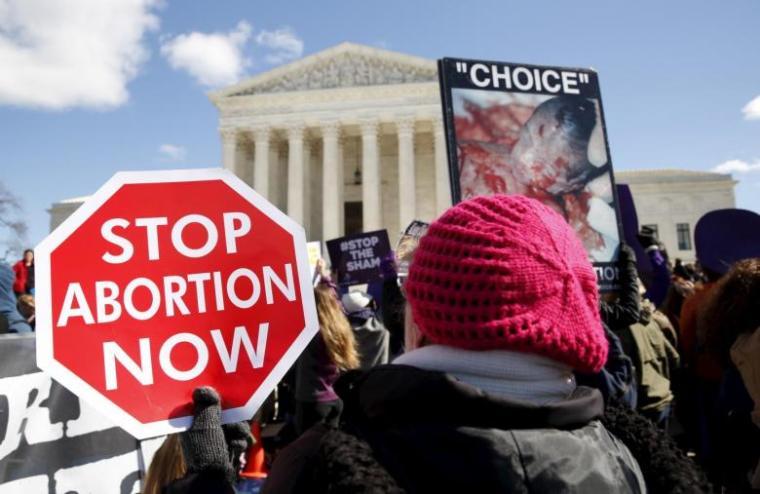Senate introduces own version of 20-week abortion ban after house passage

The U.S. Senate has formally introduced a legislation banning abortions after 20-weeks of pregnancy just days after a similar measure passed the House of Representatives.
On Thursday, Sen. Lindsey Graham (R-S.C.), with the support of 45 GOP senators, introduced the Pain-Capable Unborn Child Protection Act, which would penalize medical providers who perform abortions after 20 weeks of gestation with up to five years in prison or fines, or both.
Under the proposed legislation, abortion providers must receive informed consent from the woman seeking abortions certifying that she has been provided the gestational age of the fetus, a description of the law and her rights under it.
The bill would also require abortionists to submit annual data to the National Center for Health and Statistics about abortions that were performed after 20 weeks.
The legislation contains exceptions in cases of rape if the woman received medical treatment or counseling at least 48 hours before undergoing the abortion or if the rape was reported to law enforcement, The Hill reported.
Exceptions would also apply in cases when the pregnancy is the result of rape or incest against a minor that has been reported to either social services or law enforcement.
On Tuesday, the House passed its own 20-week abortion ban by a vote of 237–189. A similar legislation was approved by the House in 2015, but it failed to pass the Senate.
Graham guaranteed on Thursday that the measure will be considered by the upper chamber. "I am 100 percent confident that this issue will come to the floor of the Senate because Mitch McConnell and the leaders all are behind this bill," he said.
However, the legislation is not expected to gather the 60 votes needed to pass the Senate again this year as the Republicans only hold a 52-seat majority.
Rep. Trent Franks (R-Ariz.), the bill's House sponsor, has called on the Senate to end the legislative filibuster to get the measure passed in the upper chamber, but Graham dismissed the idea.
President Donald Trump has issued a statement on Monday, vowing to sign the bill into law if it were to reach his desk.
The bill, which is based on model legislation developed by National Right to Life in 2010, has been criticized by Democratic senators as extreme and harmful.
"I hope Senate Republican leaders make the right choice — commit not to bring this extreme, harmful legislation up for a vote — and start sending a message to the people across the country looking to us for solutions that Congress is putting them first, not partisan politics," said Sen. Patty Murray (Wash.), the ranking Democrat on the Senate Health Committee.
Similar measures are currently in effect in 16 states, namely, Ohio, Texas, Nebraska, Idaho, Oklahoma, Alabama, Georgia, Louisiana, Arkansas, North Dakota, South Dakota, West Virginia, Wisconsin, South Carolina, Kentucky and Kansas.
 Christians don't have to affirm transgenderism, but they can’t express that view at work: tribunal
Christians don't have to affirm transgenderism, but they can’t express that view at work: tribunal Archaeology discovery: Medieval Christian prayer beads found on Holy Island
Archaeology discovery: Medieval Christian prayer beads found on Holy Island Presbyterian Church in America votes to leave National Association of Evangelicals
Presbyterian Church in America votes to leave National Association of Evangelicals Over 50 killed in 'vile and satanic' attack at Nigerian church on Pentecost Sunday
Over 50 killed in 'vile and satanic' attack at Nigerian church on Pentecost Sunday Ukrainian Orthodox Church severs ties with Moscow over Patriarch Kirill's support for Putin's war
Ukrainian Orthodox Church severs ties with Moscow over Patriarch Kirill's support for Putin's war Islamic State kills 20 Nigerian Christians as revenge for US airstrike
Islamic State kills 20 Nigerian Christians as revenge for US airstrike Man who served 33 years in prison for murder leads inmates to Christ
Man who served 33 years in prison for murder leads inmates to Christ


 Nigerian student beaten to death, body burned over ‘blasphemous’ WhatsApp message
Nigerian student beaten to death, body burned over ‘blasphemous’ WhatsApp message 'A new low': World reacts after Hong Kong arrests 90-year-old Cardinal Joseph Zen
'A new low': World reacts after Hong Kong arrests 90-year-old Cardinal Joseph Zen Iran sentences Christian man to 10 years in prison for hosting house church worship gathering
Iran sentences Christian man to 10 years in prison for hosting house church worship gathering French Guyana: Pastor shot dead, church set on fire after meeting delegation of Evangelicals
French Guyana: Pastor shot dead, church set on fire after meeting delegation of Evangelicals ‘Talking Jesus’ report finds only 6% of UK adults identify as practicing Christians
‘Talking Jesus’ report finds only 6% of UK adults identify as practicing Christians Mission Eurasia ministry center blown up in Ukraine, hundreds of Bibles destroyed: 'God will provide'
Mission Eurasia ministry center blown up in Ukraine, hundreds of Bibles destroyed: 'God will provide' Church holds service for first time after ISIS desecrated it 8 years ago
Church holds service for first time after ISIS desecrated it 8 years ago Burger King apologizes for 'offensive campaign' using Jesus' words at the Last Supper
Burger King apologizes for 'offensive campaign' using Jesus' words at the Last Supper Uganda: Muslims abduct teacher, burn him inside mosque for praying in Christ’s name
Uganda: Muslims abduct teacher, burn him inside mosque for praying in Christ’s name